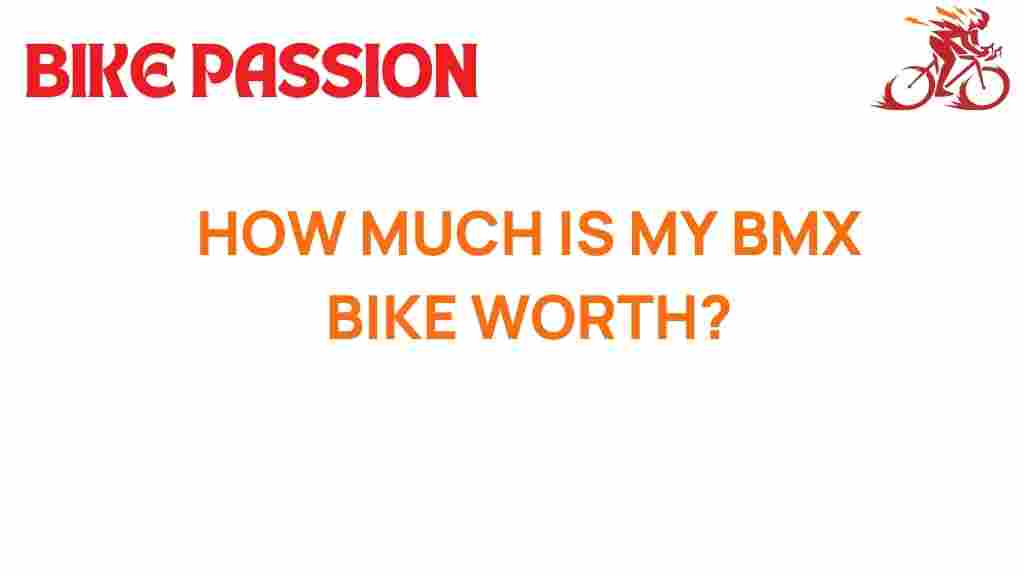Unlocking the Secrets: How Much Is Your BMX Bike Really Worth?
When it comes to BMX bikes, many riders and collectors often find themselves asking, “How much is my BMX bike really worth?” Understanding the BMX bike value is crucial whether you’re looking to sell, trade, or simply appraise your ride. In this comprehensive guide, we will explore the factors that influence BMX pricing, how to assess the condition of your bike, and offer valuable resale tips to help you navigate the used bike market.
Understanding BMX Bike Value
The first step in determining the worth of your BMX bike is to understand what contributes to its value. Here are some key factors to consider:
- Brand and Model: Popular brands like Haro, Mongoose, and Redline can fetch higher prices.
- Condition: The overall state of the bike, including wear and tear, plays a significant role in its value.
- Age: Vintage BMX models may have a different value compared to newer models.
- Upgrades: Aftermarket parts and upgrades can increase a bike’s value.
- Market Demand: Trends in the BMX community can affect pricing.
BMX Condition: A Major Factor in Appraisal
The condition of your BMX bike is perhaps the most critical aspect when it comes to bike appraisal. Here’s how to evaluate it:
- Frame: Check for cracks, dents, or rust.
- Wheels: Inspect the rims and spokes for damage or bending.
- Components: Look at the brakes, pedals, and handlebars for functionality.
- Tires: Assess tread wear and punctures.
- Cleanliness: A well-maintained bike is often valued higher.
Step-by-Step Process for Appraising Your BMX Bike
Now that you know the factors affecting BMX bike value, let’s dive into a step-by-step process for appraising your bike:
1. Research Your BMX Model
Start by identifying your bike’s brand and model. Check online resources, forums, and BMX communities to understand the typical pricing for similar models. Websites like Bike Index can be helpful in finding historical prices and trends.
2. Assess the Condition
Use the guidelines provided above to evaluate your bike’s condition. Take notes on any issues or upgrades that might influence its value.
3. Check the Used Bike Market
Visit local classifieds, online marketplaces like eBay, and dedicated BMX forums to see what similar bikes are selling for. This will give you a realistic idea of the current market.
4. Consider Seasonal Trends
The used bike market can fluctuate based on the season. For example, summer months might see higher demand for BMX bikes. Adjust your expectations accordingly.
5. Set a Competitive Price
Based on your research, set a price that reflects your bike’s condition, age, and market trends. Be prepared to negotiate with potential buyers.
Resale Tips for Your BMX Bike
- Clean and Tune: Before listing your bike, clean it thoroughly and make any necessary repairs.
- High-Quality Photos: Take clear, well-lit photos from multiple angles.
- Detailed Description: Provide a comprehensive description, including the bike’s history and any modifications.
- Be Honest: Disclose any flaws or damage to maintain trust with potential buyers.
- Utilize Social Media: Share your listing on social media platforms and BMX groups to reach a wider audience.
Understanding Market Trends in BMX
Staying informed about market trends is essential for both buyers and sellers. Here are some current trends to watch:
- Vintage BMX Collectibles: There is a growing interest in vintage BMX bikes, making them more valuable.
- Custom Builds: Custom bikes with unique parts often fetch higher prices.
- Environmental Awareness: More consumers are opting for used bikes due to sustainability concerns, increasing demand.
Engaging with BMX Collectors
If you’re a collector or looking to sell to one, understanding their preferences can greatly enhance your selling strategy. Collectors often look for:
- Limited edition models
- Specific colors or configurations
- Complete sets of bikes from certain eras
Engaging with bike collectors through forums or social media can provide insights into what they are currently seeking and willing to pay.
Troubleshooting Common Issues in BMX Appraisal
Sometimes, you might encounter challenges when appraising your BMX bike. Here are some common issues and how to troubleshoot them:
1. Conflicting Information
If you’re finding inconsistent prices for similar models, try checking multiple sources and consider the condition differences. Engage in community discussions to clarify values.
2. Lack of Market Activity
If your bike model isn’t frequently listed, it may be challenging to determine its value. In this case, consider reaching out to local bike shops for their input.
3. Emotional Attachment
It’s common to feel emotionally attached to a bike, making it hard to price it objectively. To overcome this, focus on facts and market data rather than sentimental value.
Conclusion
Determining how much your BMX bike is worth involves a combination of research, assessment of BMX condition, and understanding market trends. By following the steps outlined in this article, you can confidently navigate the used bike market and make informed decisions whether you’re buying or selling. Remember that the BMX bike value is influenced by various factors, so stay informed and be prepared to adjust your expectations as needed.
For more insights on BMX bikes, check out this helpful resource that covers everything from maintenance to customization. Happy riding!
This article is in the category Gear and created by BikePassion Team
